新版PEP六年级英语
新版PEP小学英语六年级上册1-6单元知识点总结
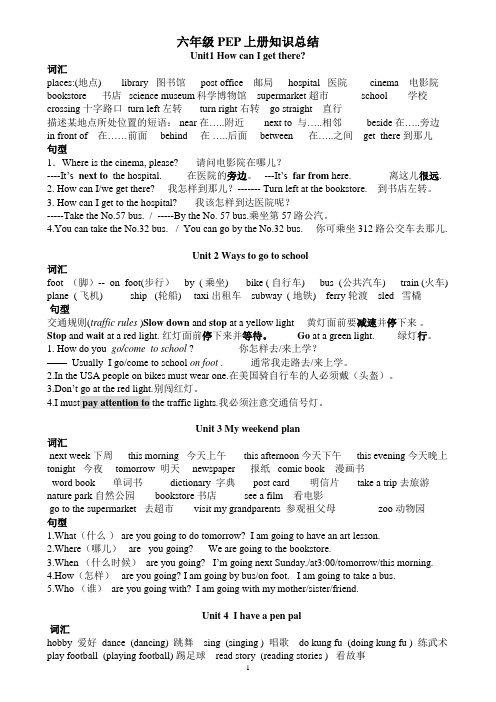
六年级PEP上册知识总结Unit1 How can I get there?词汇places:(地点) library 图书馆 post office 邮局 hospital 医院 cinema 电影院bookstore 书店 science museum科学博物馆 supermarket 超市 school 学校crossing 十字路口 turn left 左转 turn right 右转 go straight 直行描述某地点所处位置的短语: near 在…..附近 next to 与…..相邻 beside 在…..旁边in front of 在……前面 behind 在…..后面 between 在…..之间 get there 到那儿句型1.Where is the cinema, please? 请问电影院在哪儿?----It’s next to the hospital. 在医院的旁边。
---It’s far from here. 离这儿很远.2. How can I/we get there? 我怎样到那儿?------- Turn left at the bookstore. 到书店左转。
3. How can I get to the hospital? 我该怎样到达医院呢?-----Take the No.57 bus. / -----By the No. 57 bus.乘坐第57路公汽。
4.You can take the No.32 bus. / You can go by the No.32 bus. 你可乘坐312路公交车去那儿.Unit 2 Ways to go to school词汇foot (脚)-- on foot(步行) by ( 乘坐) bike ( 自行车) bus (公共汽车) train (火车) plane ( 飞机) ship (轮船) taxi 出租车 subway ( 地铁) ferry 轮渡 sled 雪橇句型交通规则(traffic rules )Slow down and stop at a yellow light 黄灯面前要减速并停下来。
新pep小学英语六年级上册教案5篇

新pep小学英语六年级上册教案5篇新pep小学英语六年级上册教案5篇教案中对每个课题或每个课时的教学内容,教学步骤的安排,教学方法的选择,板书设计,教具或现代化教学手段的应用,下面小编给大家带来关于新pep 小学英语六年级上册教案,方便大家学习新pep小学英语六年级上册教案1教学目标知识目标:能够进行物品归属的问话与答语,并能根据物体的远近,正确使用this和that。
能力目标:能听懂,会说要求的单词和句子情感价值:进一步提高对英语学习的热情,培养更加稳定的学习兴趣。
能积极主动地参与课堂活动,在情景对话中大胆开口,主动模仿。
教学重点学习和练习正确书写四会单词和四会句子.教学难点正确使用代词this和that。
课时数 2教学过程 1.热身 / 复习(Warming-up / Revision)1)播放课本附录中的歌曲I want to be your friend, 渲染课堂气氛。
2)把小动物面具挂在墙上,让学生说出它们是什么动词,是谁的。
2.新课导入(Presentation)1)展示本课教学挂图,让学生观察,并提出问题:What are Peter and Lisa doing?What are they talking about?2)播放本课录音,让学生听,然后讨论自己的猜测是否正确。
3)再放录音,让学生仔细听:谁扮演bear?谁的头饰找不到了?最后找到了吗?4)指导学生跟读录音。
5)让学生四人一组分角色表演会话。
6)鼓励学生戴面具到讲台上来表演。
3.趣味操练(Practice)1)教师将全班划分成6~8个小组,每组发一张白纸,每张白纸的最上面都写有“失物招领处”。
要求每组画出3~4种物品,供其它组认领。
2)每组分成两部分,一部分当失主去其它组找丢失物品,另一部分留在本组提供物品。
用所学句型进行交际活动。
3)播放本课投影片,让学生边看边配音。
4. 拓展活动(Additional activities)1)回家听本课录音,模仿语音语调。
新版PEP小学英语六年级上册1-6单元知识点总结
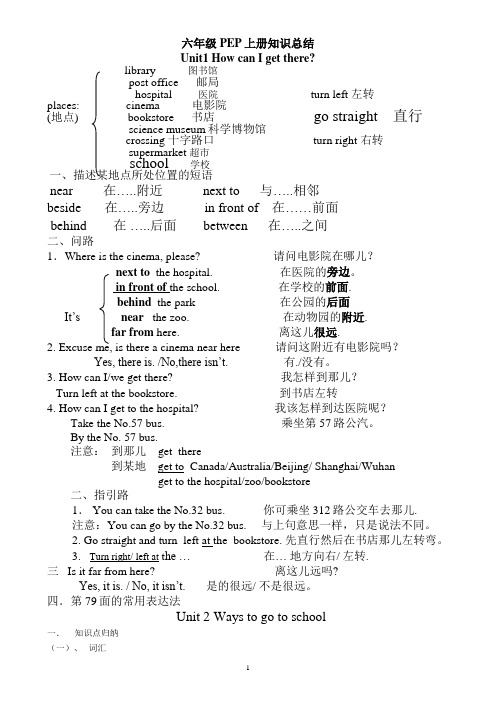
六年级PEP上册知识总结Unit1 How can I get there?library 图书馆post office 邮局hospital 医院turn left 左转places: cinema 电影院(地点) bookstore 书店go straight 直行science museum科学博物馆crossing 十字路口 turn right 右转supermarket 超市school 学校一、描述某地点所处位置的短语near 在…..附近 next to 与…..相邻beside 在…..旁边 in front of 在……前面behind 在…..后面 between 在…..之间二、问路1.Where is the cinema, please? 请问电影院在哪儿?next to the hospital. 在医院的旁边。
in front of the school. 在学校的前面.behind the park 在公园的后面It’s near the zoo. 在动物园的附近.far from here. 离这儿很远.2. Excuse me, is there a cinema near here 请问这附近有电影院吗?Yes, there is. /No,there isn’t. 有./没有。
3. How can I/we get there? 我怎样到那儿?Turn left at the bookstore. 到书店左转4. How can I get to the hospital? 我该怎样到达医院呢?Take the No.57 bus. 乘坐第57路公汽。
By the No. 57 bus.注意:到那儿 get there到某地 get to Canada/Australia/Beijing/ Shanghai/Wuhanget to the hospital/zoo/bookstore二、指引路1. You can take the No.32 bus. 你可乘坐312路公交车去那儿.注意:You can go by the No.32 bus. 与上句意思一样,只是说法不同。
新版PEP小学英语六年级词汇表(含常用表达法和不规则动词)
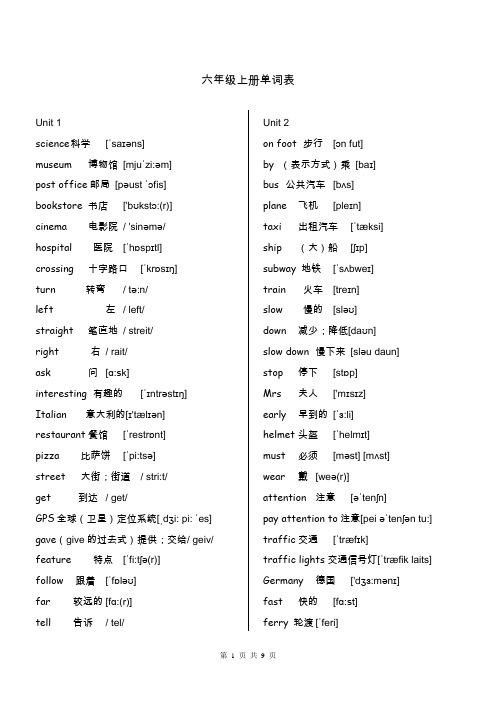
六年级上册单词表Unit 1science科学[ˈsaɪəns]museum博物馆[mjuˈzi:əm]post office邮局[pəust ˈɔfis] bookstore书店['bʊkstɔ:(r)] cinema电影院/ 'sinəmə/ hospital 医院[ˈhɒspɪtl] crossing十字路口[ˈkrɒsɪŋ]turn转弯/ tə:n/left 左/ left/straight笔直地/ streit/right右/ rait/ask 问[ɑ:sk]interesting 有趣的[ˈɪntrəstɪŋ] Italian意大利的[ɪ'tælɪən] restaurant餐馆[ˈrestrɒnt]pizza比萨饼[ˈpi:tsə]street大街;街道/ stri:t/get 到达/ get/GPS全球(卫星)定位系统[ˌdʒi: pi: ˈes] gave(give的过去式)提供;交给/ geiv/ feature 特点[ˈfi:tʃə(r)]follow跟着[ˈfɒləʊ]far较远的 [fɑ:(r)]tell 告诉/ tel/ Unit 2on foot步行[ɔn fut]by(表示方式)乘[baɪ]bus 公共汽车[bʌs]plane飞机[pleɪn]taxi 出租汽车[ˈtæksi]ship(大)船[ʃɪp]subway地铁[ˈsʌbweɪ]train火车[treɪn]slow慢的[sləʊ]down减少;降低[daʊn]slow down慢下来[sləu daun]stop停下[stɒp]Mrs夫人['mɪsɪz]early早到的[ˈɜ:li]helmet头盔[ˈhelmɪt]must必须[məst] [mʌst]wear戴[weə(r)]attention注意[əˈtenʃn]pay attention to注意[pei əˈtenʃən tu:] traffic交通[ˈtræfɪk]traffic lights交通信号灯[ˈtræfik laits] Germany德国['dʒɜ:mənɪ]fast快的[fɑ:st]ferry 轮渡 [ˈferi]Munich 慕尼黑(德国城市)['mju:nɪk] Alaska 阿拉斯加州(美国州名)[əˈlæskə] sled 雪橇[sled]PaPa Westray 帕帕韦斯特雷岛Scotland苏格兰['skɒtlənd]Unit 3visit 拜访[ˈvɪzɪt]film电影[fɪlm]see a film看电影[si: ə film]trip旅行[trɪp]take a trip去旅行[teɪk ə trɪp] supermarket超市[ˈsu:pəmɑ:kɪt] evening 晚上;傍晚[ˈi:vnɪŋ]tonight在今晚[təˈnaɪt]tomorrow明天[təˈmɒrəʊ]next week下周[nekst wi:k] dictionary 词典dictionarycomic滑稽的[ˈkɒmɪk]comic book [ˈkɔmik buk](儿童的)连环画册word 单词[wɜ:d]word book单词书postcard明信片[ˈpəʊstkɑ:d]lesson 课[ˈlesn]space太空[speɪs]travel(尤其长途)旅行[ˈtrævl]half一半[hɑ:f]price价格[praɪs] Mid-autumn Festival[mɪd ˈɔ:təm ˈfestɪvl] 中秋节together一起[təˈgeðə(r)]get together聚会[ɡet təˈɡeðə] mooncake月饼['mu:nkeɪk]poem诗[ˈpəʊɪm]moon月亮[mu:n]Unit 4studies ['stʌdɪz](study的第三代称单数形式)学习puzzle谜[ˈpʌzl]hiking远足[ˈhaɪkɪŋ]pen pal 笔友[ˈhaɪkɪŋ]hobby业余爱好[pen pæl]idea想法;主意[aɪˈdɪə]amazing令人惊奇的 [əˈmeɪzɪŋ] shall表示征求意见[ʃəl]goal射门[gəʊl]join加入[dʒɔɪn]club俱乐部[klʌb]share分享[ʃeə(r)]Canberra['kænbərə]堪培拉(澳大利亚首都)Unit 5factory工厂[ˈfæktri]worker 工人[ˈwɜ:kə(r)]postman邮递员[ˈpəʊstmən] businessman[ˈbɪznəsmæn]商人;企业家police officer警察[pəˈli:s ˈɔfisə] fisherman渔民[ˈfɪʃəmən] scientist科学家[ˈsaɪəntɪst] pilot飞行员[ˈpaɪlət]coach教练[kəʊtʃ]country 国家[ˈkʌntri]head teacher校长[hed ˈti:tʃə] sea 大海[si:]stay保持[steɪ] university大学[ˌju:nɪˈvɜ:səti] gym体育馆[dʒɪm]if如果[ɪf]reporter记者[rɪˈpɔ:tə(r)] use使用[ju:s]type 打字[taɪp]quickly快速地[ˈkwɪkli] secretary秘书[ˈsekrətri]Unit 6angry生气的[ˈæŋgri]afraid害怕[əˈfreɪd]sad 难过的[sæd]worried 担心的;发愁的[ˈwʌrid] happy高兴的[ˈhæpi]see a doctor看病[si: əˈdɔktə] wear穿[weə(r)] more更多的[mɔ:(r)]deep深的[di:p]breath呼吸[breθ]take a deep breath[teik ədi:p breθ]深深吸一口气count数数[kaʊnt]count to ten数到十[kaʊnt]chase追赶[tʃeɪs]mice(mouse的复数)老鼠/ mais/ bad邪恶的;坏的[bæd]hurt(使)受伤[hɜ:t]ill有病;不舒服[ɪl]wrong 有毛病[rɒŋ]should应该[ʃʊd]feel 觉得;感到[fi:l]well 健康;身体好[wel]sit坐[sɪt]grass草坪[grɑ:s]hear听见[hɪə(r)]ant 蚂蚁[ænt]worry 担心;担忧[ˈwʌri]stuck 陷住;无法移动[stʌk]mud 泥[mʌd]pull 拉;拽 [pʊl]everyone 每人[ˈevriwʌn]六年级英语上册常用表达法Unit1-- Where is the museum shop?博物馆的商店在哪儿?--It`s near the doo.r 在大门附近--How can we get there?我们怎么到那儿?--Turn left at the bookstore. 到书店左转Unit2-- How do you come to school?你怎么来学校的?--Usually, I come on foot.通常我走路来In the USA people on bikes must wear one.在美国骑自行车的人必须戴头盔Don’t go at the red light! 别闯红灯I must pay attention to the traffic lights.我必须注意交通信号灯Unit3--What are you going to do tomorrow?你明天打算做什么?--I’m going to have an art lesson.我要上美术课We’re going to draw some pictures in Renmin Park.我们要到人民公园去画画--Where are you going? 你们打算去哪儿?--We’re going to the cinema.我们打算去电影院 When are you going? 你们什么时候去?Unit4--What are Peter `s hobbies?彼得有什么爱好?--He likes reading stories 他喜欢读故事--Does he live in Sydney? 他住在悉尼吗?--No, he doesn’t 不,他没有--Does he like doing word puzzles and going hiking? 他喜欢猜字谜和远足吗?--Yes, he does 是的,他喜欢Unit5--What does he do? 他是做什么的?--He is a businessman. 他是商人--Where does he work? 他在哪儿工作?-- He works at sea. 他在海上工作。
PEP 新版六年级英语上册单词表
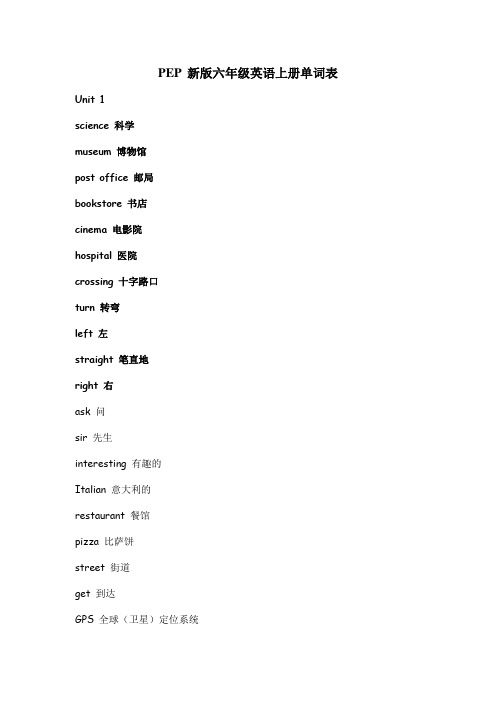
PEP 新版六年级英语上册单词表Unit 1
science 科学
museum 博物馆
post office 邮局
bookstore 书店
cinema 电影院
hospital 医院
crossing 十字路口
turn 转弯
left 左
straight 笔直地
right 右
ask 问
sir 先生
interesting 有趣的
Italian 意大利的
restaurant 餐馆
pizza 比萨饼
street 街道
get 到达
GPS 全球(卫星)定位系统
gave (give 的过去式)提供;交给feature 特点
follow 跟着
far 较远的
tell 告诉
Unit 2
on foot 步行
by (表示方式)乘
bus 公共汽车
plane 飞机
taxi 出租汽车
ship (大)船
subway 地铁
train 火车
slow 慢的
down 减少;降低
slow down 慢下来
stop 停下
Mrs 夫人
early 早到的
helmet 头盔
must 必须
wear 戴
attention 注意
pay attention to 注意
traffic 交通
traffic lights 交通信号灯Munich 慕尼黑(德国城市)Germany 德国
Alaska 阿拉斯加州(美国州名)sled 雪橇
fast 快的
ferry 轮渡
Papa Westray 帕帕韦斯特雷岛Scotland 苏格兰。
(完整版)新版PEP小学英语六年级词汇表(含常用表达法和不规则动词)
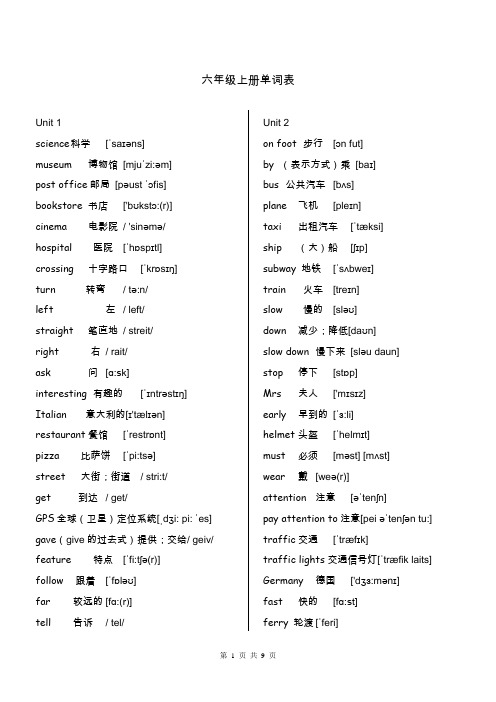
六年级上册单词表Unit 1science科学[ˈsaɪəns]museum博物馆[mjuˈzi:əm]post office邮局[pəust ˈɔfis] bookstore书店['bʊkstɔ:(r)] cinema电影院/ 'sinəmə/ hospital 医院[ˈhɒspɪtl] crossing十字路口[ˈkrɒsɪŋ]turn转弯/ tə:n/left 左/ left/straight笔直地/ streit/right右/ rait/ask 问[ɑ:sk]interesting 有趣的[ˈɪntrəstɪŋ] Italian意大利的[ɪ'tælɪən] restaurant餐馆[ˈrestrɒnt]pizza比萨饼[ˈpi:tsə]street大街;街道/ stri:t/get 到达/ get/GPS全球(卫星)定位系统[ˌdʒi: pi: ˈes] gave(give的过去式)提供;交给/ geiv/ feature 特点[ˈfi:tʃə(r)]follow跟着[ˈfɒləʊ]far较远的 [fɑ:(r)]tell 告诉/ tel/ Unit 2on foot步行[ɔn fut]by(表示方式)乘[baɪ]bus 公共汽车[bʌs]plane飞机[pleɪn]taxi 出租汽车[ˈtæksi]ship(大)船[ʃɪp]subway地铁[ˈsʌbweɪ]train火车[treɪn]slow慢的[sləʊ]down减少;降低[daʊn]slow down慢下来[sləu daun]stop停下[stɒp]Mrs夫人['mɪsɪz]early早到的[ˈɜ:li]helmet头盔[ˈhelmɪt]must必须[məst] [mʌst]wear戴[weə(r)]attention注意[əˈtenʃn]pay attention to注意[pei əˈtenʃən tu:] traffic交通[ˈtræfɪk]traffic lights交通信号灯[ˈtræfik laits] Germany德国['dʒɜ:mənɪ]fast快的[fɑ:st]ferry 轮渡 [ˈferi]Munich 慕尼黑(德国城市)['mju:nɪk] Alaska 阿拉斯加州(美国州名)[əˈlæskə] sled 雪橇[sled]PaPa Westray 帕帕韦斯特雷岛Scotland苏格兰['skɒtlənd]Unit 3visit 拜访[ˈvɪzɪt]film电影[fɪlm]see a film看电影[si: ə film]trip旅行[trɪp]take a trip去旅行[teɪk ə trɪp] supermarket超市[ˈsu:pəmɑ:kɪt] evening 晚上;傍晚[ˈi:vnɪŋ]tonight在今晚[təˈnaɪt]tomorrow明天[təˈmɒrəʊ]next week下周[nekst wi:k] dictionary 词典dictionarycomic滑稽的[ˈkɒmɪk]comic book [ˈkɔmik buk](儿童的)连环画册word 单词[wɜ:d]word book单词书postcard明信片[ˈpəʊstkɑ:d]lesson 课[ˈlesn]space太空[speɪs]travel(尤其长途)旅行[ˈtrævl]half一半[hɑ:f]price价格[praɪs] Mid-autumn Festival[mɪd ˈɔ:təm ˈfestɪvl] 中秋节together一起[təˈgeðə(r)]get together聚会[ɡet təˈɡeðə] mooncake月饼['mu:nkeɪk]poem诗[ˈpəʊɪm]moon月亮[mu:n]Unit 4studies ['stʌdɪz](study的第三代称单数形式)学习puzzle谜[ˈpʌzl]hiking远足[ˈhaɪkɪŋ]pen pal 笔友[ˈhaɪkɪŋ]hobby业余爱好[pen pæl]idea想法;主意[aɪˈdɪə]amazing令人惊奇的 [əˈmeɪzɪŋ] shall表示征求意见[ʃəl]goal射门[gəʊl]join加入[dʒɔɪn]club俱乐部[klʌb]share分享[ʃeə(r)]Canberra['kænbərə]堪培拉(澳大利亚首都)Unit 5factory工厂[ˈfæktri]worker 工人[ˈwɜ:kə(r)]postman邮递员[ˈpəʊstmən] businessman[ˈbɪznəsmæn]商人;企业家police officer警察[pəˈli:s ˈɔfisə] fisherman渔民[ˈfɪʃəmən] scientist科学家[ˈsaɪəntɪst] pilot飞行员[ˈpaɪlət]coach教练[kəʊtʃ]country 国家[ˈkʌntri]head teacher校长[hed ˈti:tʃə] sea 大海[si:]stay保持[steɪ] university大学[ˌju:nɪˈvɜ:səti] gym体育馆[dʒɪm]if如果[ɪf]reporter记者[rɪˈpɔ:tə(r)] use使用[ju:s]type 打字[taɪp]quickly快速地[ˈkwɪkli] secretary秘书[ˈsekrətri]Unit 6angry生气的[ˈæŋgri]afraid害怕[əˈfreɪd]sad 难过的[sæd]worried 担心的;发愁的[ˈwʌrid] happy高兴的[ˈhæpi]see a doctor看病[si: əˈdɔktə] wear穿[weə(r)] more更多的[mɔ:(r)]deep深的[di:p]breath呼吸[breθ]take a deep breath[teik ədi:p breθ]深深吸一口气count数数[kaʊnt]count to ten数到十[kaʊnt]chase追赶[tʃeɪs]mice(mouse的复数)老鼠/ mais/ bad邪恶的;坏的[bæd]hurt(使)受伤[hɜ:t]ill有病;不舒服[ɪl]wrong 有毛病[rɒŋ]should应该[ʃʊd]feel 觉得;感到[fi:l]well 健康;身体好[wel]sit坐[sɪt]grass草坪[grɑ:s]hear听见[hɪə(r)]ant 蚂蚁[ænt]worry 担心;担忧[ˈwʌri]stuck 陷住;无法移动[stʌk]mud 泥[mʌd]pull 拉;拽 [pʊl]everyone 每人[ˈevriwʌn]六年级英语上册常用表达法Unit1-- Where is the museum shop?博物馆的商店在哪儿?--It`s near the doo.r 在大门附近--How can we get there?我们怎么到那儿?--Turn left at the bookstore. 到书店左转Unit2-- How do you come to school?你怎么来学校的?--Usually, I come on foot.通常我走路来In the USA people on bikes must wear one.在美国骑自行车的人必须戴头盔Don’t go at the red light! 别闯红灯I must pay attention to the traffic lights.我必须注意交通信号灯Unit3--What are you going to do tomorrow?你明天打算做什么?--I’m going to have an art lesson.我要上美术课We’re going to draw some pictures in Renmin Park.我们要到人民公园去画画--Where are you going? 你们打算去哪儿?--We’re going to the cinema.我们打算去电影院 When are you going? 你们什么时候去?Unit4--What are Peter `s hobbies?彼得有什么爱好?--He likes reading stories 他喜欢读故事--Does he live in Sydney? 他住在悉尼吗?--No, he doesn’t 不,他没有--Does he like doing word puzzles and going hiking? 他喜欢猜字谜和远足吗?--Yes, he does 是的,他喜欢Unit5--What does he do? 他是做什么的?--He is a businessman. 他是商人--Where does he work? 他在哪儿工作?-- He works at sea. 他在海上工作。
新版PEP小学六年级上册英语全册教案
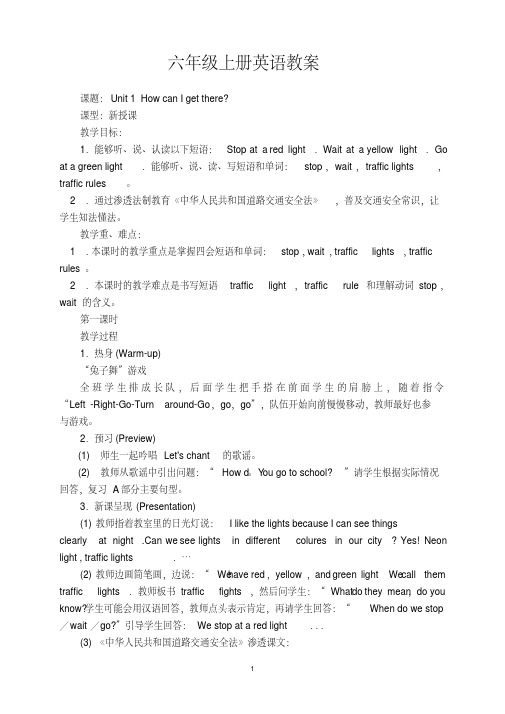
六年级上册英语教案课题:Unit 1 How can I get there?课型:新授课教学目标:1.能够听、说、认读以下短语:Stop at a red light.Wait at a yellow light.Go at a green light.能够听、说、读、写短语和单词:stop,wait,traffic lights,traffic rules。
2.通过渗透法制教育《中华人民共和国道路交通安全法》,普及交通安全常识,让学生知法懂法。
教学重、难点:1.本课时的教学重点是掌握四会短语和单词:stop,wait,traffic lights,traffic rules。
2.本课时的教学难点是书写短语traffic light,traffic rule和理解动词stop,wait的含义。
第一课时教学过程1.热身(Warm-up)“兔子舞”游戏全班学生排成长队,后面学生把手搭在前面学生的肩膀上,随着指令“Left-Right-Go-Turn around-Go,go,go”,队伍开始向前慢慢移动,教师最好也参与游戏。
2.预习(Preview)(1)师生一起吟唱Let's chant的歌谣。
(2)教师从歌谣中引出问题:“How d。
Y ou go to school?”请学生根据实际情况回答,复习A部分主要句型。
3.新课呈现(Presentation)(1)教师指着教室里的日光灯说:I like the lights because I can see thingsclearly at night .Can we see lights in different colures in our city ? Yes! Neon light , traffic lights.…(2)教师边画简笔画,边说:“We have red,yellow,and green light We call them traffic lights.教师板书traffic fights,然后问学生:“What do they mean,do you know?学生可能会用汉语回答,教师点头表示肯定,再请学生回答:“When do we stop /wait/go?”引导学生回答:We stop at a red light...(3)《中华人民共和国道路交通安全法》渗透课文:《中华人民共和国道路交通安全法》第二十六条交通信号灯由红灯、绿灯、黄灯组成。
新版人教版PEP英语六年级上册全册课件

•( ( )6.)_5_. _—_E_x_c_u_s_e_m__e_,__w_h_eisrethies tlihberalirbyr,parleya?se—? It's ________ the cinema. A. nAe.xWt heBr.en’exst to CB..aWt here C. What
•T__h_e__y__a_r_e___in___t_h__e__m__u__seum.
• 2. Is Grandpa there?
No,he isn't. • ________________________
Let’s talk !
1.Is there a museum shop?
2.Where is the museum shop?
C:Where is it?
D:It’s near
next to
behind
park, zoo, post office, school, museum ,bookstore, hospital, cinema , library
in front of
Help others Help yourselves.let's help people in need 帮助别人就是帮助自己 让我们帮助身边需要帮助 的人!
( )7. I want ___________ a post card.
PEP人教版
全册精品PPT课件
Unit 1 How can I Unit 2 Ways to go Unit 3 My weekend
get there?
to school
plan
A
2套
A
2套
A
2套 Recycle 1
- 1、下载文档前请自行甄别文档内容的完整性,平台不提供额外的编辑、内容补充、找答案等附加服务。
- 2、"仅部分预览"的文档,不可在线预览部分如存在完整性等问题,可反馈申请退款(可完整预览的文档不适用该条件!)。
- 3、如文档侵犯您的权益,请联系客服反馈,我们会尽快为您处理(人工客服工作时间:9:00-18:30)。
How do these pictures make you feel? It makes me feel_____________.
afraid
angry
happy
summary
表达自己情绪的句型: be+情绪性形容词(happy, sad, angry)
重点词汇:
mice 老鼠
chase 追赶
happy, happy, happy every day!
sad
Let’s reviewan!gry 复习一下!
worried
afraid
happy
How does he /she feel?他/她感觉怎么样?
He’s
Sarah’s brother, Sam.
自主学习
根据单词提示,自读对话,回答问题: • Why is the cat angry with the mice? 为什么猫对老鼠很生气?
-Why _is____ (be)he sad?
根据课文将下面补全完整
当堂检测
It’s cold outside. Sam and Sarah are talking about the black cat . The bl ack cat is _a__n_g_r_y___with the ___m__i_c_e____. Because the _m_i_c_e__ are bad.They _h_u_r_t_ _people. The black cat is ch_a_s_i_ng the m. The __m_i_c_e_ are afraid of the ___c_a_t___.
新人教版六年级上册
Unit6 How do you feel?
Part A Let’s talk
Let’s chant
sad,
பைடு நூலகம்
sad, you are very sad.
angry, angry,
I’m angry.
worried, worried, Tom is worried.
afraid, afraid, she’s afraid.
cBaerctoauosne:t卡he通miceabaoreutb关ad于. 因c为h老as鼠e 坏追。赶T mheicyehu老rt鼠peoplbee.他a们fra伤id害o人f 们对。……Th害e怕cat is banagdry坏w的it,h 不the好m的.猫对h他ur们t 伤很害生气。him 他 be angry of 对……生气 Maybe 可能
bad 邪恶的;坏的
hurt (使)受伤
be angry with … 对……感到生气
be afraid of … 对……感到害怕
• I am afraid of _c_h_a_s__in_g__ (chase) snakes. • There are a lot of _m__ic_e__ (mouse) under the ground.
Sam:这个卡通关于什么? Sarah:它是关于一只小猫的。
小猫是一个警察。 Sam:醋! Sarah:他逮老鼠。它们害怕它
。 Sam:为什么? Sarah:因为老鼠很坏。它们祸
害人类。这只猫很生它们 的气。 Sam:或许我们的猫现在正在 逮老鼠。
老鼠mouse的复数是mice
合作探究
1.Read after the tape . 2.Read after the teacher. 3.Act it in your group.
Q1 : What does the cat do? The cat is a police officer. Q2 : What is the cat doing? It’s chasing the mice. mouse
chase
angry afraid
Q3:How does the cat feel? The cat feels angry. Q4 : How do the mice feel? They feel afraid.
• Amy is angry __w__it_h_ me. Because I broke her favorit
e toy.
• How _d_o___ (do) they feel? • My mother is worried _a_b__o_ut my grandpa’s health.
• -How _d_o_e_s_ (do) Jack feel? -He _f_e_e_l_s(feel) sad.
I can read
• cartoon:卡通 chase 追赶
about 关于 mice 老鼠
• be afraid of 对……害怕
• bad 坏的,不好的
• hurt 伤害
him 他
• be angry of 对……生气
• Maybe 可能
A
关于 be afraid of 害怕
因为
be afraid of (doing)sth. 害怕 /担心(做)某事 be angry with sb.生某人的气
